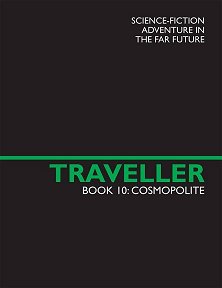
If you choose a military or scout or merchant career for your character you have a wealth of options to choose from... but until now if you have decided that he is (or at least was before taking up adventuring) a Scholar or an 'ordinary' Citizen, you were a bit limited, at least as far as rules went, for what you could use to create your background - and that all-important skill set.
First, though, there's the question of education. Before you even start your career proper your character might wish to attend university. This replaces your first term in a career, and like any path you need to roll successfully to get in. If you fail, you have to choose something else or even submit to the draft. Characters who'd like to get some real-world experience first may take a couple of terms in a career before going to university - this could be an opportunity for a career change if you have, say, served a couple of terms in the military, then go to study before embarking on a quite different life thereafter.
Graduation confers a few benefits such as a bonus on entry rolls to certain careers and the option to make a commission roll if entering a military career. There is also the option to attend medical school, which takes another term but sets you up as a qualified medical doctor. Rather disappointingly, there isn't an option here to attend graduate school and 'pile it higher and deeper' to gain a PhD. There are several tables to help you write your character's backstory, the usual 'lifepath' events... and these, of course, crop out throughout the book as each career option is explored.
Next comes a detailed exploration of citizen careers. It covers just about every civilian occupation that isn't a merchant, a noble or an entertainer. Here is the backbone of civilisation, the people who make ordinary everyday things happen. There are three main areas: artisans (who make things), funcionaries (who administrate) and 'pillars of society' - these last include politicians, union leaders, diplomats, activists and more; those who feel that their ideas can make a difference to the common good. Each area subdivides enabling you to create a whole range of backgrounds from day-wage labourer to an architect designing whole cities (or starships) or the next revolutionary computer chip, the individual who runs a city to the fellow who comes to fix the plumbing, a rabble-rousing agitator to a lawyer or diplomat or an elected representative... just about anything you can think of doing can be covered by the rules in this section.
We then move on to the scholar careers. For some strange reason, the assumption is made that scholars study science of some kind... I'm sitting in a university writing this review in my lunch break as it happens, and even if I'm in Computer Science we have all sorts here from fine arts and history and languages through sciences and a large business school; and they'd all regard themselves as scholars! Anyway, there are various options from those who work in laboratories (or libraries) to field researchers who get out into the real world to pursue their studies to the lone genius following his ideas in isolation. Even here, oddly enough, you cannot gain a PhD but if you take the lecturer path far enough you might gain the title of Professor.
Then there's an interesting half-way house between Citizen and Scholar - the Teacher. It's a whole new career path for those whose burning desire is to pass on information to others as guru or instructor. We next come to mustering out benefits, handled in the same way as for any career, although there are some special options depending on which of these careers have been followed.
Next is a discussion of 'Scholar-Travellers' - how to use that scholar character as an adventurer and how to turn a member of another career into a scholar, perhaps later in life when he's ready to reflect on the world around him rather than react to it. This is followed by matters important to any scholar's heart: funding and publishing ('Publish or Perish' as they say in academia!) complete with the necessary rules to make it all happen. Scholars are funded by bodies given the catch-all title of Societies and Fellowships, these can be anything from wealthy companies or individuals to full-blown universities. Some examples are provided to help you get going, use them as is or as templates and inspiration for creating your own.
For those who want to play them out in detail, there's a complete breakdown of the research process complete with the necessary game mechanics - like a lot of Traveller, you can have a lot of fun playing through these on your own creating a rich background for a character who may never see 'play' in the accepted role-playing sense of the world. Again there are examples which could be used as the underpinnings for a game based around scholarly pursuits, or to inspire your own.
There are more options too: special advantages (and disadvantages) of having exception Education or Intelligence scores, rules for gifted amateurs, citizen options, a whole bunch of rules about teaching (and learning), the development of networks - a citizen advantage that helps you build up a network of contacts wherever you go - and more.
A thoroughly fun and detailed work that helps to round out the peoples of your Traveller universe with all sorts of different folk... if nothing else, something for the military to defend and the merchants to sell to!
Return to Book 10: Cosmopolite page.
Reviewed: 14 October 2014

